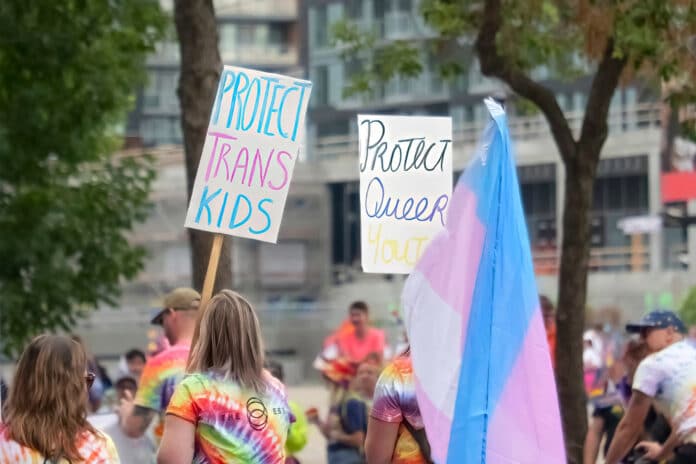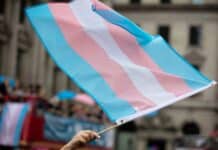
(LifeSiteNews) — A leading adolescent psychiatrist in Finland spoke out about the popular craze of transgenderism, warning from her own professional experience that young people are being influenced by social contagion to identify as another gender, that surgical and chemical interventions are leaving kids more distressed than ever, and that pro-transgender organizations are refusing to acknowledge the facts.
In an Oct. 30 letter published by the Free Press, Dr. Riittakerttu Kaltiala chronicled her own experiences and serious concerns regarding pediatric gender interventions, writing that “gender transition has gotten out of hand.”
“Medical organizations are supposed to transcend politics in favor of upholding standards that protect patients,” Kaltiala said. “When medical professionals start saying they have one answer that applies everywhere, or that they have a cure for all of life’s pains, that should be a warning to us all that something has gone very wrong.”
Kaltiala, who serves as the chief psychiatrist in the department of adolescent psychiatry at Finland’s Tampere University Hospital and has published over 230 scientific articles, according to the Free Press, detailed a “dramatic development” in adolescent psychiatry in recent decades.
She spoke of a widespread acceptance of transgender ideology, spurred in part by an influential 2011 paper by Dutch clinicians suggesting that gender-confused children (mostly boys) who were given puberty blockers “thrived as members of the opposite sex,” a report that subsequently became an international “gold standard.”
She also pointed to a simultaneous “activist movement” that declared transgender mutilation to be a “human right.”
“In response to all this, in Finland the Ministry of Social Affairs and Health wanted to create a national pediatric gender program,” she wrote in the Free Press. “The task was given to the two hospitals that already housed gender identity services for adults.”
Kaltiala became the head of her hospital’s pediatric gender program after her department opened its own program in 2011.
The Finnish psychiatrist said she “had some serious questions” about the venture. But after “a big round of discussions with bioethicists” in which she shared her concerns about the pediatric treatments, the national board on health ethics gave her hospital a statement “cautiously suggesting we undertake this new intervention.”
Kaltiala said she quickly saw that the patients who flocked to her department weren’t like those studied in the Dutch experiment.
While the Dutch clinicians had been dealing with young, “high-functioning” yet gender-confused boys who apparently displayed no other mental issues, Kaltiala said “90 percent of our patients were girls, mainly 15 to 17 years old,” of whom “the vast majority presented with severe psychiatric conditions” including many “on the autism spectrum.”
She said the girls often hadn’t expressed gender dysphoria until adolescence, and that their expression of “trans” identity was frequently linked to transgender content the young people had seen online, social contagion among their peers, or advice given to their parents from an LGBT organization.
Kaltiala became aware that her experience was not unique, and that clinics throughout Europe were seeing the same thing even though “no one was saying anything publicly.”
The discontinuity between the recommendations and the reality produced a “crisis of confidence” among herself and her peers. Kaltiala said hormonal interventions for kids began yielding harmful results, and girls were seeing their lives crumble after taking the hormone drugs.
But despite the concerns, and even after Kaltiala and some of her colleagues raised the alarm in a 2015 paper, she said their field “became more committed to expanding these treatments” rather than “acknowledging the problems we described.”
Meanwhile, in the U.S., American clinicians were promoting a new model called “gender-affirming care,” she said, noting that the standard “urged clinicians simply to accept a child’s assertion of a trans identity … ”
She said doctors who questioned the ideology were “subjected to organized campaigns of vilification and threats to their careers,” frightening many into silence.
Regardless, Kaltiala and her colleagues pressed for further investigation into what they were seeing. She said she asked her country’s Council for Choices in Health Care (COHERE) in 2015 “to create national guidelines for treatment of gender dysphoria in minors,” and renewed the request in 2018 along with colleagues. That request was accepted, and in 2020 COHERE released its findings, concluding that the pro-gender-transition model had been “biased and unreliable.”
“It had taken quite a while, but I felt vindicated,” she said. Finland’s review was followed by similar reviews by the United Kingdom, Sweden, and other nations.
But, she pointed out, the battle is far from over, especially in the United States.
Kaltiala expressed serious concern about the ongoing U.S. model that assumes that children “know” their gender identity and must be affirmed in it and noted that the American Academy of Pediatricians (AAP) has “been actively hostile to the message my colleagues and I are urging.”
Further, she said she is “disturbed” by American gender clinicians’ exaggeration of the gender-confused youth suicide risk to push “gender medicalization,” a practice she said is “dishonest and extremely unethical.”
“Medicine, unfortunately, is not immune to dangerous groupthink that results in patient harm,” Kaltiala said, comparing the transgender movement with the “recovered memory craze of the 1980s and ’90s” in which women began believing they had recovered blocked memories of being sexually abused, frequently due to suggestions by therapists.
In the same way, Kaltiala said “gender transition has gotten out of hand.”
She pointed out that the “recovered memory craze” came to an end “when therapists, journalists, and lawyers investigated and exposed what was happening.”
The same thing, she said, must happen in the field of pediatric gender transition.
“We need to learn from such scandals,” she said.
As LifeSiteNews has extensively reported, a spike in transgender identification and surgical and chemical mutilation of children in recent years has coincided with kids across the country being actively encouraged in the culture and their classrooms to adopt “transgender,” “gender fluid,” or “non-binary” identities.










